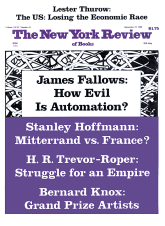In response to:
The Schools Flunk Out from the April 12, 1984 issue
To the Editors:
Andrew Hacker’s analysis of the recent reports on education shrewdly observed that “stressing deficiencies in our schools can deflect attention from shortcomings in areas occupied entirely by adults.” Moreover, he argued, school reform per se is not a likely lever to upgrade our national performance in the ways sought by the national commissions and task forces.
These telling points have a practical implication: social investment in the education of adults may make more sense than squeezing the schools.
If it is so urgent that we catch up swiftly in international competition—technological, commercial, and scientific—then we can hardly wait for a fresh generation to come up through the schools. We need to strengthen the skills, knowledge, and (dare we say it) wisdom of our present cadres of workers, managers, teachers, and professionals.
Here are four examples of the possibilities.
Irving Howe recently asked pointedly: who is doing today, for New York’s current Hispanic in-migrants, what the settlement house educational programs did for immigrant Jews in the early twentieth century?
Second, how about a policy of paid educational leave for American workers, especially those in declining sectors? Such schemes are being vigorously debated in Canada.
Third, where’s the present-day version of the Great Books discussion groups? In them, middle-class adults enjoyed companionable involvement with works exemplifying just that vision of the good life which Hacker notes is so lamentably lacking in these reports.
Fourth, why not revive our potent tradition of scholarship outside academe? Throughout the nineteenth century this nation’s intellectual life, including its learned societies, welcomed competent investigators beyond the professoriate: bankers, lawyers, women of leisure, postmen. Today, with so many Ph.D.s for whom there’s no room in academe, it would seem especially attractive to reaffirm that the world of learning welcomes those who cannot, or do not choose to earn their living on a campus.
A final thought: these sorts of learning by adults might well impel young people to take their own educations more seriously. Surely children are moved by the ways in which adults do or don’t model the life to the mind. Professor Hacker hints at this in his observation that “adult determination” seems to be a crucial factor in the success of private, “magnet,” Catholic, and other schools in which attendance is self-selected by the students’ parents. Adults who are spirited learners themselves, wield a conjurable influence over the lives of youth.
Ronald Gross
University Seminars, Columbia University
New York, New York
This Issue
September 27, 1984



